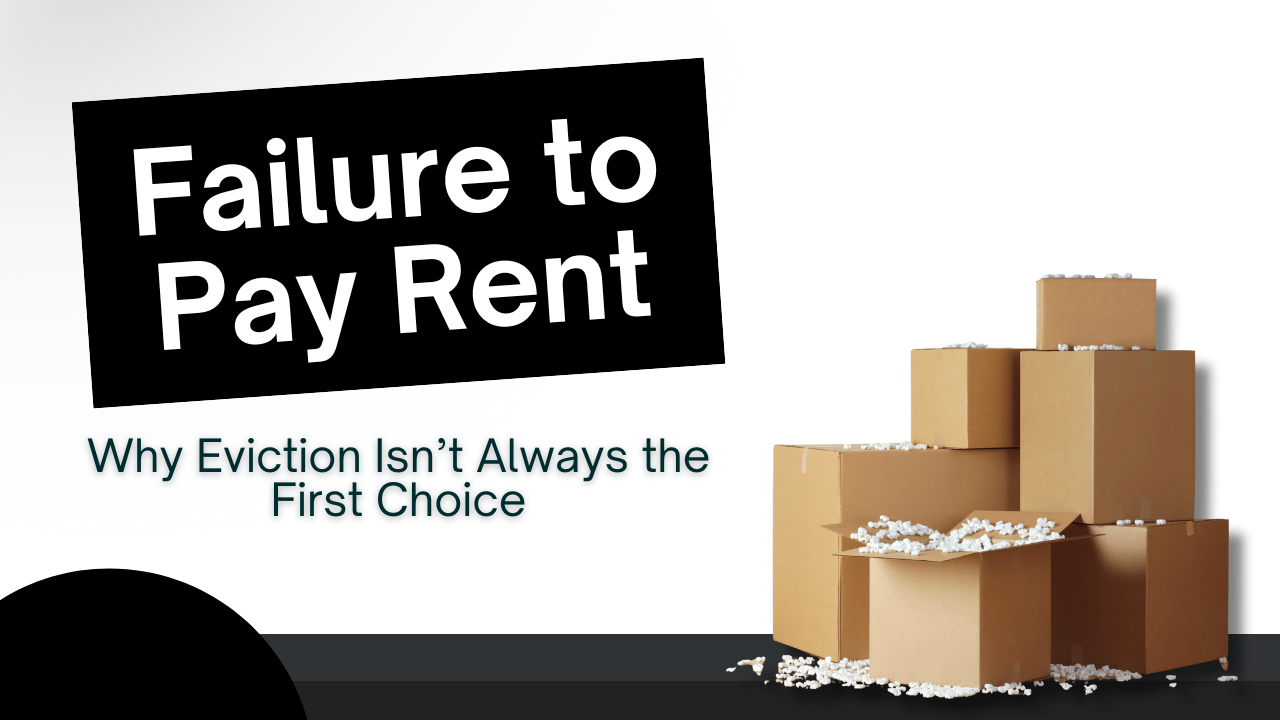
Managing tenants who fall behind on rent requires patience, diplomacy, and professionalism.
It’s not an ideal situation.
When you’re faced with missed payments, the natural instinct may be to head straight toward eviction. That’s an understandable knee-jerk reaction. After all, consistent and timely rent is what provides your cash flow and short-term earnings. A non-paying tenant can quickly turn a profitable property into a financial burden.
However, eviction does not always have to be the immediate next step. As professional property managers, we’ve actually found that it’s not always the best or most cost-effective course of action. In fact, we can tell you that alternatives to eviction can save time, money, and stress while still resolving the underlying issue.
Eviction is always an option if nothing else works. But for now, let’s focus on the practical, legal, and financial reasons that eviction shouldn’t be your first response to a tenant’s failure to pay rent. We’ll also look at proactive strategies that make better alternatives.
Eviction Costs in Sonoma County
Before you serve a Notice to Quit, it’s important to understand the full cost of an eviction. We’re not just talking about the cost in dollars. We’re also reminding owners that there’s a real time cost. There’s a lot of effort required in an eviction.
There’s often more stress than anyone would like to take on.
- Financial Burden
Evictions are expensive. Legal fees, court filing costs, process server charges, and potential lost rent can add up to a depressing loss. A typical eviction in California can cost property owners thousands of dollars, depending on the jurisdiction and how long the process takes.
On top of that, most owners are losing two or three months of rent during the proceedings. If the courts are backed up, it may be even more. Then, there are turnover costs and vacancy time before a new tenant is secured.
- Time and Hassle
In California, evictions are difficult. They are not quick. We have tenant-friendly laws and protections that require paperwork, court dates, mediation, and waiting time for responses. All of this can be a drain not only on your time but on emotional bandwidth, too.
- Property Damage Risk
Evicted tenants, especially those who feel mistreated or desperate, may care very little about the property on their way out. There could be damage to the home and while some damages can be deducted from the security deposit, the rest may never be recovered.
- Unpredictable Court Outcomes
Even if you follow the process perfectly, judges may grant extensions or rule in the tenant’s favor under certain conditions, particularly if the tenant raises habitability issues, claims discrimination, or files for bankruptcy.
Why Tenants Fall Behind
Not every case of missed rent is due to negligence or bad intentions. Understanding why your tenant is struggling can help you come up with a solution that gets out ahead of eviction. There might have been a job loss or an income disruption. Tenants who go through layoffs, a reduction in hours, or unexpected medical bills can find themselves in temporary financial turmoil, but they will very likely want to stay in their home if possible.
Family emergencies and health problems can also cause a tenant to be late in paying rent. Those serious health issues or family emergencies often come with both emotional and financial strain.
Well-qualified tenants might struggle with budgeting. Those tenants might still be responsive and cooperative if given a chance to catch up.
We’re asking owners to remember that not all nonpayment cases are created equal, and treating them all with immediate eviction can be both ineffective and unnecessarily punitive. You want to be consistent with your rent collection policies. However, when a tenant needs help, it’s in your own interest to provide some alternatives when possible.
Alternative Strategies to Eviction
Here are some alternatives that can protect the interests of a rental property owner while preserving a positive landlord-tenant relationship.
- Keep the Lines of Communication Open
As soon as rent is late, reach out to your tenant. Ideally, this will be in writing, even if it’s a text. Maintain a personal tone and ask if there’s been a mistake or if the tenant is having a problem. Demonstrating empathy while setting clear expectations can open the door to a mutually beneficial solution.
- Offer a Payment Plan
If the tenant has experienced a temporary setback, a short-term payment plan might be all they need to solve the problem and get caught up. This is a best-case scenario because it means your rent will be coming in. Structure the agreement in writing, including:
-
- How much they will pay toward past-due rent each week or month
- Their agreement to pay the regular rent due in the following months, in addition to the payment plan
- The deadline for being caught up in full
- Consequences for missed payments
A well-structured plan ensures you get paid over time while avoiding legal escalation. This is especially advantageous when tenants are willing to communicate, take accountability, and work with you.
- Partial Payment Agreements
Accepting partial rent can be tricky because it may reset the eviction timeline. But if done correctly and documented properly (with a waiver that partial payment does not waive your rights), it can buy both parties some time.
- Cash for Keys
What if it’s not a temporary financial setback and your tenant isn’t sure they’ll be able to catch up with the rent or pay any new rent? It may sound counterintuitive, but offering a small financial incentive for a tenant to voluntarily vacate (maybe $500 or $1,000) can save you thousands in legal fees and lost rent. If you sense that a tenant can’t or won’t pay moving forward, helping them leave peacefully may be the smartest business decision.
Referral to Assistance Programs
Local and federal rent relief programs can help tenants cover past-due rent and prevent eviction. Familiarize yourself with what’s available in your area. Offering to help the tenant apply will show that you care about their stability, and it’s also likely to ensure you get your rent paid faster.
In exceptional circumstances, some landlords offer rent deferments or temporary reductions to help tenants stay in place and eventually pay back what they owed. While not ideal for long-term situations, it can prevent a vacancy and future income loss. This was especially useful during the COVID-19 pandemic, in preventing excessive evictions.
When Eviction Is the Right Choice
Of course, there are times when eviction is necessary and justified. Here’s when you may want to proceed:
-
- The tenant is unresponsive or dishonest.
- They’ve broken multiple lease terms beyond nonpayment.
- They’ve been offered opportunities to catch up but continue missing payments.
- They are intentionally withholding rent as leverage.
- They pose a threat to other tenants or the property.
In these cases, protecting your investment may require legal action. Even then, it’s critical to follow California’s strict eviction laws. Don’t go to court without the help of a property manager or an eviction attorney.
How to Protect Yourself Moving Forward
While eviction alternatives can help resolve short-term problems, the best strategy is proactive prevention. Here’s how to minimize the risk of rent issues in the first place:
- Conduct Thorough Tenant Screening
Always check income verification, credit history, rental references, and eviction records. Look beyond just numbers and ask yourself if this is a tenant who is likely to communicate and handle challenges responsibly. Remember that fair housing laws are critical while you’re screening. California law requires you to screen applications as they’re received when you collect an application fee. Stick to your rental criteria.
- Invest in Clear Lease Agreements
Spell out due dates, grace periods, late fees, and communication expectations clearly in the lease. A strong lease is your first line of defense in any dispute.
- Provide Automated Rent Collection
Set tenants up with an online portal or auto-pay option to reduce the risk of late payments due to forgetfulness or banking issues.
- Build an Emergency Fund
Have reserves set aside so that a missed month of rent doesn’t put you in a bind. Being financially stable allows you to handle hiccups more rationally and less emotionally.
- Maintain Professional Boundaries
Be friendly but firm. Treat your rental as a business and keep communication respectful and in writing. Emotional reactions often lead to costly mistakes.
Unpaid rent feels like a breach of trust and a threat to your income. But jumping straight to eviction often leads to higher costs, longer vacancies, and legal headaches. More importantly, it can prevent opportunities to resolve the issue in a way that benefits both parties.
 When faced with a non-paying tenant, the smarter approach is to pause, evaluate the situation holistically, and consider creative, mutually respectful alternatives. Not only can this save you money and time, but it can also enhance your reputation as a fair and smart property owner.
When faced with a non-paying tenant, the smarter approach is to pause, evaluate the situation holistically, and consider creative, mutually respectful alternatives. Not only can this save you money and time, but it can also enhance your reputation as a fair and smart property owner.
Not sure how to proceed when rent is late? We can help. Please contact us at Prestige Real Estate & Property Management. We manage homes in Sonoma County, including Santa Rosa, Windsor, Sebastopol, Petaluma, and Rohnert Park.
